Three Faces of Eve, The (1957)
“Sometimes I don’t know whether you’re crazy or think I am.”
|
Synopsis: |
|
Genres:
Response to Peary’s Review: In retrospect, TTFOE does come across as both quaint and somewhat silly, with a couple of scenes in particular straining credulity. Early in the film, Eve Black tries to strangle her daughter with a curtain pull (a truly freaky scene to witness, as we see the girl with the cord around her neck), but no consequences emerge other than Eve being taken to the doctor. Then, during her initial meeting with Dr. Luther (Cobb), Eve mentions having lost a second child four months earlier; Dr. Luther pauses for nary a second before launching into another topic, without even a cursory, “I’m so sorry for your loss”, let alone exploration of how this might be contributing to her current state of psychological affairs. Meanwhile, the film’s denouement — when we learn through flashback why Eve is so damaged — is simply laughable in its implausibility (and nowhere close to the truth of what actually happened to Sizemore). With all that said, TTFOE remains worthy viewing for Woodward’s impressive performance. In his Alternate Oscars, Peary agrees with the Academy that Woodward deserved her award as Best Actress of the Year, and writes that regardless of the foolish script, “Woodward is still compelling, whether she is quiet, hysterical, naughty, flirtatious, creepy, sweet, weak, or strong”. Apparently Woodward “wasn’t fond of her own performance because she felt she couldn’t devote enough time to any of Eve’s three personalities”, but the role was nonetheless “an ideal showcase for this versatile actress whose talents [at the time] were still a secret”. As Peary points out, “it’s significant that [Woodward] even makes us feel sorry for Eve Black when she starts to fade away”, given that “whatever her faults, [she] was essentially a real person, with fears and worries of her own” — a woman who, when she “wasn’t destroying Eve White’s life”, was “actually helping her” by rebelling against her “unhealthy marriage” and terrible husband (Wayne). Speaking of Wayne, I’ve never really been a fan of his work, but find his character here entirely plausible; it’s frighteningly easy to imagine a man reacting exactly as he does — with both hostility and confusion — to his wife’s breakdown. Note: It’s interesting and a bit odd that Peary doesn’t mention the other film about multiple personalities released that same year: Hugo Haas’s Lizzie, starring Eleanor Parker and based on a novel by Shirley Jackson. It’s a worthy, must-see film in its own right. Redeeming Qualities and Moments: Must See? Categories
Links: |
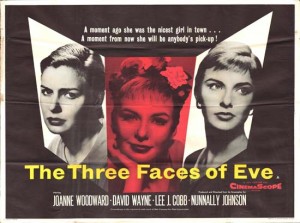
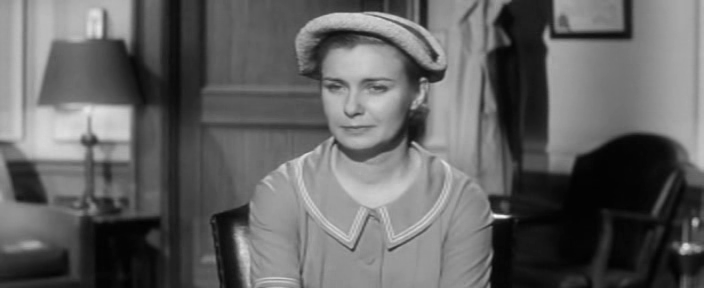
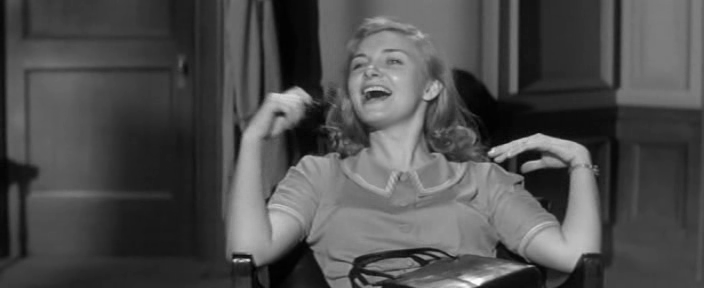
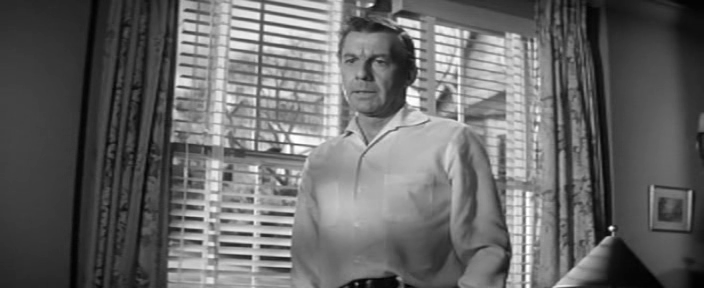
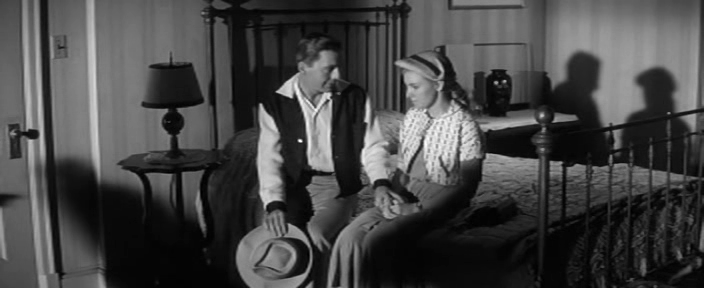
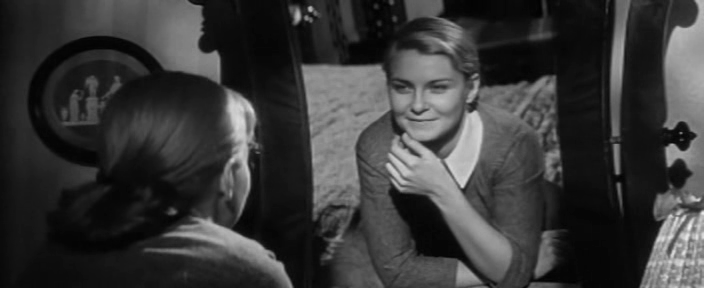
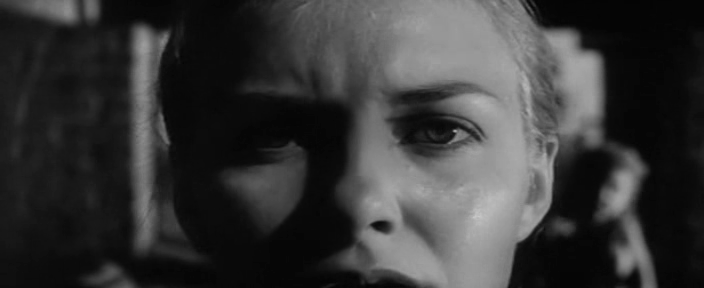
2 thoughts on “Three Faces of Eve, The (1957)”
Not must-see.
I’ve never liked this movie, nor Woodward’s performance. I do begin to like Woodward’s work as an actor as she gets older (for example, I think she’s marvelous in ‘Mr. & Mrs. Bridge’) but I think it took her awhile to really let go on-screen in a fully believable way. Her earlier performances largely come off as ‘acting’ rather than ‘being’.
That’s not to say that her work here is downright terrible. (And, admittedly, in Johnson she did not have the strongest of directors.) But I think she comes off best as the more normal Jane – and I find her a bit moving near the end of the film when, as Jane, she is putting some of the pieces of her dilemma together. (I also like her in the scene where she explains to the yummy Ken Scott that “I am that woman.” that he has read about in the paper. …Woodward’s Eve has some good luck in the Yummy Men Department: she also gets into the near-clutches of Vince Edwards as a gum-chewing lug* and is later seen dancing with a charmingly goofy sailor brute who reminded me of Woo Woo Grabowski, of ‘Sex Kittens Go To College’…uh…fame.)
A particular issue I have with Woodward is one I also have with Nicole Kidman: both women have it within them to be highly capable but I don’t find either one all that convincing when playing a woman with strong sexual urges. This is, I think, why I mainly prefer Eleanor Parker in ‘Lizzie’. I believe Parker when she plays someone on the hunt for a man.
I also happen to think ‘Lizzie’ is a more compelling film, the way it is put together. ‘TTFOE’ is stodgy and rather lifeless. I listened to the DVD commentary and learned that Johnson always considered himself a writer first and didn’t seem to care all that much about how a lack of directorial skill could affect a film. Here, not even Johnson’s wonderful DP Stanley Cortez can contribute quite enough to counter Johnson’s flat, dull way of storytelling. (Before its release, the film was 2 hours long and 30 minutes were cut. You would think the compactness would serve as a plus for the film and give it a sense of urgency – but it still feels quite long; two hours would have felt lethal.)
The DVD commentary helped me to better understand some of my additional reasons for keeping this film at arm’s length. One of those reasons being ‘the reveal’ – when we learn what triggered Eve’s mental disorder. In the film, yes, it all does come across as laughable. ~until you learn that the grandmother’s death was just one part of an intricate series of events. I won’t even try to offer any kind of understanding of those events. According to Wikipedia, Sizemore claims about her alters: “They were entities, whole in their own rights, who coexisted with my birth personality before I was born. They were not me, but they remain intrinsically related to what it means to be me.” ?!…Without considerable study on the subject, we’re all on our own with that one!
Though I can’t really recommend ‘TTFOE’ as must-see for film fanatics, it does hold interest for those (like myself) who find the ’50s in general a fascinating time for exploration of deeply psychological matters in film – even though, when compared to other such films as ‘The Snake Pit’ and ‘The Bad Seed’, etc., ‘TTFOE’ falls lamentably short.
*Edwards gets to say lug-like things like “When I spend 8 bucks on a chick, I don’t just got home with the morning paper.”
NOTE: Wikipedia entry on dissociative identity disorder (formerly known as multiple personality disorder):
http://en.wikipedia.org/wiki/Dissociative_identity_disorder
An interesting take… I am not sure I agree about Woodward’s early performances, but will need to revisit more of them. You’ve said elsewhere that you feel Woodward only came into her own once she was directed by her husband (starting with “Rachel, Rachel” in 1968).
I think she’s quite good in “The Stripper” (1963). Other earlier Woodward titles listed in GFTFF — which I’ll revisit and post on soon — are “A Kiss Before Dying” (1956), “The Long Hot Summer” (1958), “The Fugitive Kind” (1960), and “A Fine Madness” (1966).
Regarding MPD/DID… To me it’s believable that Eve Black’s pursuit of men feels a bit lacking in authenticity. It’s my understanding that those with DID act out through alter egos in an attempt to escape from the extreme hurt and vulnerability of their “true” personality (which was deeply damaged at some point in early childhood). So, Eve Black’s aggressiveness isn’t really “real” — it’s a reaction, an attempt to escape from everything toxic associated with Eve White and her self-denigrating existence. Hence the ultimate emergence of an integrating personality (Jane) without EB’s extreme behavior.
Yes, that line about spending eight bucks on a chick is quite menacing, and surprising… It caught me off-guard!